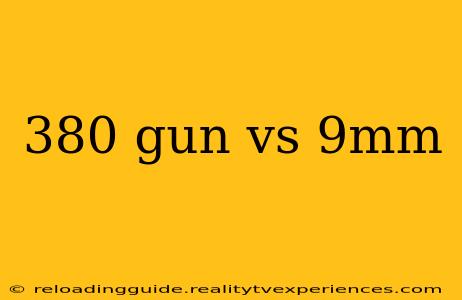Choosing the right caliber for self-defense or personal protection is a critical decision, and the .380 ACP and 9mm are two frequently considered options. This in-depth comparison will explore the key differences between these two popular calibers, helping you make an informed choice based on your needs and preferences. We'll delve into factors like ballistics, recoil, capacity, availability, and cost.
Ballistics: Power and Penetration
The most significant difference between the .380 ACP and the 9mm lies in their ballistic performance. The 9mm boasts considerably more stopping power due to its larger diameter and higher velocity. This translates to greater penetration and a wider wound cavity, increasing the likelihood of incapacitating a threat.
-
9mm: Generally delivers significantly higher muzzle energy and greater penetration than the .380 ACP. This makes it a more effective round for stopping threats at longer ranges.
-
.380 ACP: While still capable of self-defense, the .380 ACP's lower energy and penetration mean it's less effective against larger targets or those wearing heavier clothing. It's more suitable for close-range encounters.
Penetration and Expansion: A Crucial Factor
The expansion of a bullet upon impact is vital for maximizing its stopping power. Both calibers offer ammunition designed for expansion (hollow points, for example), but the 9mm generally performs better in this aspect due to its higher velocity and energy transfer. However, proper shot placement remains paramount regardless of caliber.
Recoil and Shootability
Recoil is another critical factor to consider, especially for those new to firearms or with smaller builds.
-
.380 ACP: Known for its significantly lighter recoil, making it easier to control, especially for less experienced shooters. This allows for faster follow-up shots.
-
9mm: Exhibits more noticeable recoil than the .380 ACP. While manageable for most, it can be more challenging for those with less upper body strength or experience.
Capacity: How Many Rounds You Carry
Magazine capacity plays a role in the potential for continued engagement in a self-defense scenario.
-
9mm: Generally offers higher magazine capacities than the .380 ACP, providing more rounds available in a defensive situation.
-
.380 ACP: Typically has lower magazine capacities, limiting the number of shots available before reloading.
Availability and Cost: Practical Considerations
The availability and cost of ammunition are important factors for many firearm owners.
-
9mm: Widely available and generally more affordable than .380 ACP ammunition. This makes it a more economical choice for practice and training.
-
.380 ACP: While available, .380 ACP ammunition can be less readily available in some areas and often commands a higher price per round compared to 9mm.
Choosing the Right Caliber: Your Individual Needs
Ultimately, the "better" caliber depends entirely on your individual needs and circumstances.
-
Consider the .380 ACP if: You prioritize lighter recoil, ease of handling, and a smaller, more concealable firearm. This might be ideal for smaller individuals or those prioritizing concealability above all else.
-
Consider the 9mm if: You prioritize stopping power, greater penetration, higher magazine capacity, and wider ammunition availability. This is often the preferred choice for experienced shooters who value effective self-defense capabilities.
Disclaimer: This information is for educational purposes only and should not be considered professional advice. Always consult with a qualified firearms instructor and adhere to all applicable laws and regulations regarding firearm ownership and use. Safe firearm handling practices are crucial.

